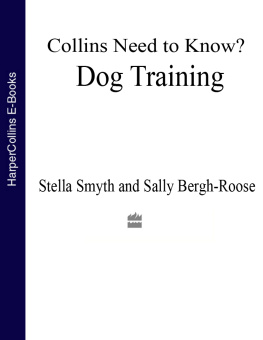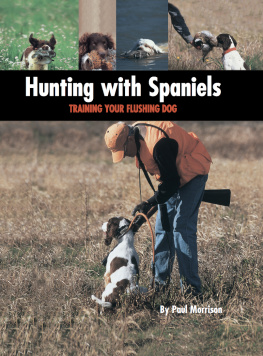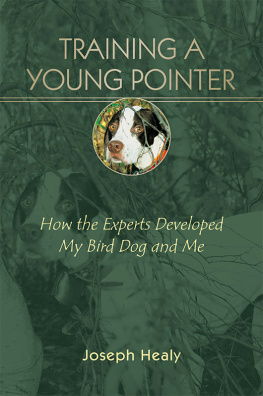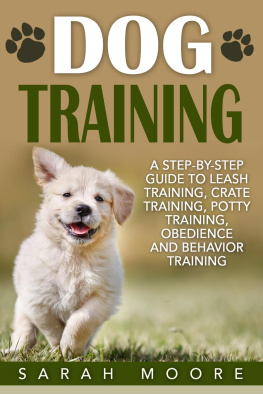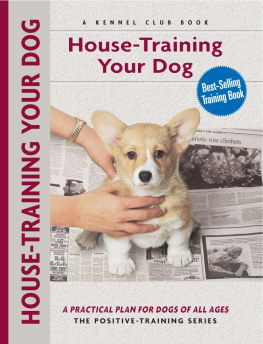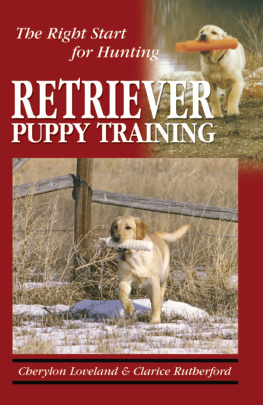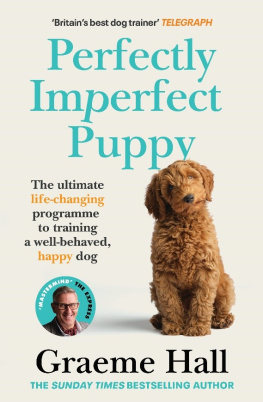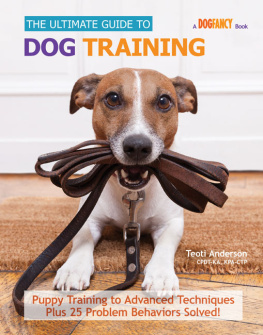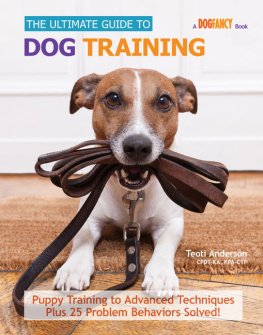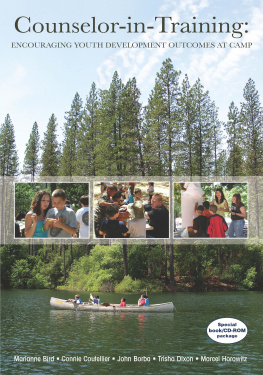
2006 Ben O. Williams
Photos Ben O. Williams
Published by
Willow Creek Press
P.O. Box 147
Minocqua, Wisconsin 54548
For more information on Willow Creek Press books and calendars, call 1-800-850-9453.
All rights reserved. No part of this book may be reproduced or transmitted in any form by any means, electronic or mechanical, including photocopying, recording, or by any information storage and retrieval system, without written permission from the Publisher.
ISBN:978-1-6075-5682-4
DEDICATION
To all the bird dogs I have owned.

ACKNOWLEDGMENTS
I wrote this book for people looking for an easier and more pleasant way to achieve their personal goals of what they want in a bird dog. But the most important acknowledgments go to Darren Brown and Andrea Donner for their help in photo setups that better illustrate the text, and for their efforts to help me expound on my philosophy and training method.
Contents
When I acquired my first bird dog, I stocked up on as much of the available literature as I could before plunging into training. While I learned a great deal from many excellent trainers, I often came away with the idea that my dog wouldnt be an effective bird dog until he was broken to wing and shot, or whoa-ed on a dime while running full-bore a hundred yards out; or that I couldnt train him without a specially-designed table or a wide variety of training paraphernalia. These books almost invariably presented everything you could have your dog do, rather than winnowing out the superfluous and focusing in on what you and your dog actually need to do to hunt well together.
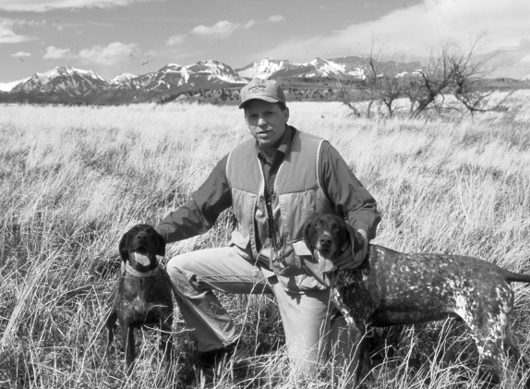
Darren Brown and his two fine German shorthaired pointers hunting Huns on the high plains of Montana.
Ben Williams training philosophy takes a far simpler yet completely innovative approach. And any bird hunter who has had the pleasure of spending time with Ben and his wonderful dogs can certainly attest to the results.
I knew of Ben Williams reputation as a bird hunter and dog trainer long before I actually met him. Still, my first day afield with him was a revelation. Not only were his dogs among the best Id ever seen, but they also hunted seamlessly with Ben and with each other without the shock collars, constant whistle blowing, or histrionics I often saw with other bird hunters. Watching a half-dozen great-looking bird dogs pour down a far hillside like water seeking the best course, only to freeze one after another, pointing and relocating to pin a running covey of Huns, was a sight I wont soon forget. But there was something else I remember from that day, beyond just seeing consistently great dog work: commands were minimal, corrections almost completely unnecessary.
I, of course, wanted to know how hed reached this level of understanding and effectiveness with his dogs, particularly with so many on the ground at once. As I recall, he smiled and remarked that they mostly trained themselves something I found hard to believe at the time, based on all that I had previously learned about bird dogs.
Later, when hunting my own dogs with Bens, I saw just what he meant. My two German short-haired pointers are used to backing each others points, although they arent often hunted with other dogs. (As there is little chance of my dogs pointing birds before Bens when they share bird country, there was no doubt they were going to do a lot of backing.) So I was surprised to see my more experienced dog back briefly in response to a point, and then charge by the phalanx of pointing and backing dogs to deliberately blow through the birds. I was mortified, as Id just finished telling Ben that my dogs backed without fail. Ben, however, just chuckled. It didnt bother him at all.
Rather than running across the field to chastise the dog, I tried Bens advice to just watch closely and let the dog work it out for himself. After several more points were made and several more point-stealing flushes we could see him becoming more comfortable, creeping cautiously up to join the rest of the backing dogs that were relocating but not pushing the birds. It was a perfect example of a situation that I could easily have made worse by intervening. Instead, the dog learned a valuable lesson about working with other dogs in a relaxed and positive environment. It was quite a lesson for me as well.
I wish to heck I could have read this book before ever heading afield with a dog.
Darren Brown
Editor, For the Love of a Dog
The first time I got to hunt with Ben was via a sideways invitation through our mutual friend, the great writer but only so-so wing shooter, Jim Fergus. (Not that that matters. Its not like its necessarily a function of character or anything, to be a good wing shooter. Its just grace, is all. Im not at all envious of those who have it.) So Ben didnt know what he was getting into. Jim said hed sideways-invited me because Im the only person he knows who shoots worse than he does. I dont follow his logic why saddle Ben and his incredible dogs with two horrid shooters, a plague of poor shooters? But I sure didnt argue.
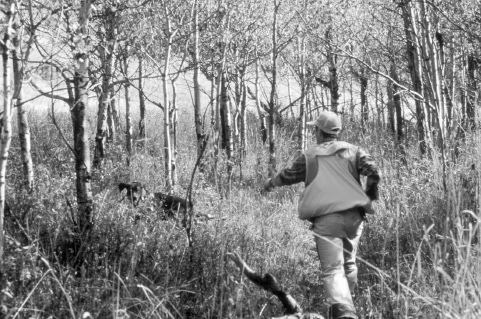
Rick Bass, author of Brown Dog of the Yaak, hunting Point-Man for sharp-tailed grouse.
As Ben mentions in this book, he likes to hunt with his own dogs, line-bred across nearly sixty years for this one landscape, and its two main species of upland birds, Huns and sharptails. He generally doesnt care to throw other dogs onto his playing field. He loves where he is, doing what hes doing, with his own dogs, and coaching and training and learning from them. Why should he want some other visitor-dog in his life?
I didnt know that. I showed up at his front porch with my beloved little Point-Man, a Yaak savage par excellence a whirling, baying, leg-humping, scent-marking, spotted dervish. Two days before I had left on our journey, Point had been sprayed by a skunk all right, Ill say it, he had pointed the skunk, then charged into the dogwood and seized it by the neck and shook it, whirling around and around in his devil-circle while I fell backwards, trying to evade the slinging spray of skunk-mist and though Id doused Point afterward with my unpatented miracle de-odorizer, enough so that he was able to ride the 650 miles to Bens house sitting in the front seat, in my lap, helping me steer, with only the faintest trace of skunkiness left (really, youd almost have to know thats what had happened to him, to figure out what the smell was), he was still pretty much completely blind, his beautiful luminous lantern-green eyes now seared an old mans sightless milky-blue, from where the skunk-venom had belted and burned him point-blank.
My vet had said his vision would return, but that it might be a few days, and he had given me some salve, which would help, although since dogs eye ducts are connected directly to their olfactory systems (as if they literally see with their noses, just as we always suspected), it would be a little harder for Point to make game, with the gunky, gacky smell of the poultice flooding his nasal passages. He might bump a few birds hed ordinarily have nailed, said Doug, my vet, but, you know, its hunting season, its what he lives for, you cant keep him from it.
Next page

